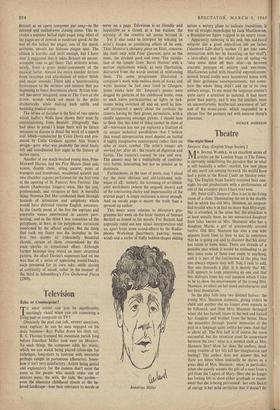Television
Echo or Counterpoint?
9-'0 what extent can you be significantly, excitingly visual when you are examining a living poet or composer on TV?
Obviously the poet can talk, answer questions, read, explain; he can be seen engaged on his daily business—Roy Fuller drove his sleek car, R. S. Thomas tramped his mountain parish long before Jonathan Miller took over on Monitor. To such things the composer adds his music, which we can watch being played (close-ups for technique, long-shots to rostrum with ensemble perhaps caught in portentous silhouette). Some- how it isn't very satisfactory. Artists being genial and explanatory for the camera don't seem the same as the people who snatch order out of anxious mess; the wife, the kids, the garden— even the obsessive childhood streets or the be- loved landscape—lose their relevance to words or notes on a page. Television is as friendly and inquisitive as a Greek at a bus station; the mystery of the creative act seems beyond it.
Yet it also seeks to interpret by echoing an artist's images or producing others of its own. Thus Monitor's obituary piece on Eliot, concern- ing itself only with Four Quartets, gave us the roses, the drained pool and even 'The circula- tion of the lymph' from 'Burnt Norton' with a narrow explicitness which, as easy illustration, distracted from the words instead of reinforcing them. The same programme illustrated a composer's work with endless shots of docks and water because he had once lived in Glasgow. Some weeks later Mr. Empson's poems were dogged by pictures of his childhood home, even to such naive particularities as lights in bed- rooms being switched off and on, until he him- self interjected a query about the methods the camera having by then grown surrealistic, with a candle appearing amongst pylons. I should hate to think that this kind of thing cannot be done at all—television has not yet explored a fraction of its unique technical possibilities—but I believe that visual interpretation must depend on tactful if highly imaginative counterpoint rather than on echo or stock symbol. The artist's images are worked for, after all : the results of digestion and fusion. The camera's cannot be raw and easy. The answer may be a multiplicity of contribu- tory forms, interacting but not so precise as to dominate.
Furthermore, in the case of poets, may I plead for the most obvious and old-fashioned tech- nique of all: namely, the screening of scribbled- over worksheets (where the anguish shows) and of the contrasting clarity and impersonality of the printed page? A single recitation is never enough. And an untidy page is nearer the truth than a spruced-up author.
This bears some relation to Monitor's pro- gramme last week on the basic themes of Samuel Beckett as found in his novels. For Beckett had expressly ruled out any visual interpretation and so, apart from some sound-effects by the Radio- phonic Workshop (heartbeats, panting, waves, wind) and a series af fluffy bobbin-shapes sliding fonati,an Miller across a watery plane to indicate transitions, it was all straight monologue by Jack MacGowran, a Baudelairian figure trapped in an empty room.
Apparently tottering to his end, this sad-faced solipsist did a good demolition job on father ('slammed Life shut), mother CI got into com- munication with her by knocking on her a love-affair, and the cliché joys of spring—to 'take some shine off their bliss'—in between staccato passages of anxiety and weariness. MacGowran acted with beautiful expressiveness; several brutal truths were hammered home with all their grotesque accompaniments; but some- how the whole thing didn't add up to its own unitary image. To my mind the language couldn't quite carry a situation so isolated. It had more point than poetry, and it was the intellect, even an uncomfortably intellectual awareness of 'art' and of the avant-garde, which responded to a phrase like 'the pastures red with uneaten sheep's placentas.'
PATRICK ANDERSON


































 Previous page
Previous page